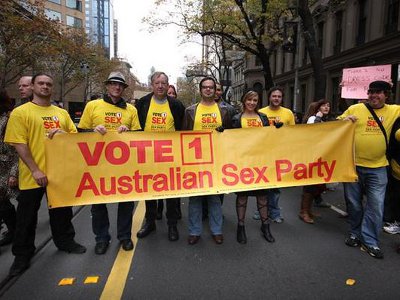Oz Sex Party Ruled Out of Queensland Election
 YNOT – The Australian Sex Party is considering legal action after the Queensland Electoral Commission denied the registered political party’s candidate a spot on the state’s March 24 parliamentary ballot.
YNOT – The Australian Sex Party is considering legal action after the Queensland Electoral Commission denied the registered political party’s candidate a spot on the state’s March 24 parliamentary ballot.
According to the commission, no party may field a candidate unless the party can prove it has at least 500 members in the state. Although the ASP claims to have 1,700 registered members in Queensland, the commission said it was able to confirm only 250.
Australian Sex Party President Fiona Patten said the party presented the election commission with 750 statutory declarations of party membership, along with addresses for the members, but only 250 people responded to the commission’s request for written confirmation of their status.
“We have 1,700 bona fide members in Queensland who have all signed a statutory declaration to say they are members of the Australian Sex Party,” Patten said. “If the Queensland government needs more proof than that, they should have a number of different tests on board to determine that — not just a demand for a personal reply.”
Even the federal government requires only 20 confirmations out of 500 alleged members to confirm a party’s eligibility for the ballot, Patten noted, and the federal election commission performs a telephone survey to ascertain membership. Requiring written confirmation of membership in what some consider a “fringe group” may cause some people to deny their affiliation with the party in order to protect their standing in their communities.
“The Queensland Electoral Commission should have been able to use other means, like the federal test, as an alternative to test the party’s bona fides,” Patten said. “The use of one personal letter to test party numbers in this day and age is completely undemocratic and is a clear breach of Sex Party members’ democratic rights under the Constitution.”
Some ASP members may have been reluctant to confirm their party membership because they own adult material that is prohibited in Queensland but not in other states.
“Queensland has the most draconian censorship laws in Australia, and many people join the Sex Party because they are concerned about government intervention in their personal lives,” she said. “It’s no wonder they didn’t want to personally communicate with the Queensland government — especially those who remember the Moonlight state — but that in no way indicates that we do not have a minimum of 500 signed-up members and meet the eligibility criteria to register in Queensland.”
“The Moonlight state” refers to a period in the 1980s during which police and elected officials ran roughshod over Queensland citizens’ civil rights. After a lengthy investigation, a number of elected and law enforcement officials were jailed and the National Party of Australia lost its 32-year hold on Queensland’s government.
“It is completely unfair that someone like Bob Katter can register a party in Queensland just because he is a sitting member of another parliament and doesn’t have to prove any members at all,” Patten said.
Katter was a member of the disgraced National Party government, though he was not charged with any crimes. He broke with the party in 2001 and as an Independent won election to represent another state in the Australian House of Representatives. In June 2011, he applied to register Katter’s Australian Party. In August that year, Katter merged his party with Parliament member Aidan McLindon’s Queensland Party in order to meet election commission rules and field candidates for Queensland’s March election.
The merged party, called Katter’s Australian Party, is ideologically similar to the so-called Tea Party branch of the ultra-conservative political movement in the U.S., with some elements of socialism thrown into the mix. The party dismisses global warming, considers homosexuals undeserving of equal protection under the law and wishes to limit citizens’ access to potentially “harmful” material. At the same, time, the party claims to seek seemingly contradictory extensions of protection for individual liberties, restrictions on foreign trade, nationalization of some private assets and limitations on corporate growth.
Patten said she believes Queenslanders might have elected Sex Party candidates over Katter candidates. She herself was edged out in a 2010 Victoria election by a margin of only 2,000 votes. That same year, the ASP polled more than 5 percent in federal elections.
“Our preferences in the [March] Queensland election could well have decided the outcome,” Patten said. “Being denied our rightful opportunity to contest this election means we will look at our legal options both before and after the poll.”









